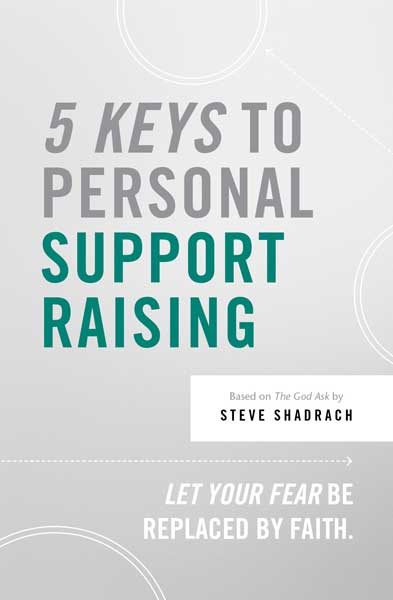
The perception exists in some Non-Westerners that the West are “rich,” and so it is easy for them to support Non-Western missionaries. This perception is fed in part by a misconception of financial realities in both cultures and currency values relative to local economies.
Just as it is not true that all Westerners are rich, it is not true that there are no resources in Non-Western countries. People work and generate wealth and can give towards the work of advancing the gospel. In any culture, people have to be presented with a clear vision and a clear invitation to give.
We have to help Non-Western gospel workers understand that the West cannot and should not sustain the support of the work on their own. Non-Westerners also need to share the responsibility and privilege of investing in gospel work both locally and globally.
That being said, let’s take a step back and ask some fundamental questions about funding for gospel work that go beyond geography:
- How is the advance of the gospel to be funded?
- Who is responsible for funding the gospel?
- How should we evaluate an appeal for funding?
Funding the Gospel
It is clear from Scripture that the establishment and advancement of God’s purposes and kingdom are to be funded by His people. Let us understand that God as the originator and creator is well capable of speaking things or reality into existence. He does not ask us to give because He is short of resources.
God gave Moses a master plan for the tabernacle in Exodus 25 and also a plan for how to fund it. Moses was to invite everyone. This plan has not changed with time.
The basic principle I see is that one receives a clear and definite vision from the Lord, and the Lord requires the vision bearer to make clear invitations to people.
God also makes it clear that some of those who are invited will give and others will not – “everyone whose heart prompts them to give” – Exodus 25:2.
Giving is good for us as it shifts the focus from our natural disposition to self-preservation, to a higher call where we actually focus on others rather than ourselves. When we give, we worship – it is “a fragrant offering, an acceptable sacrifice, pleasing to God” Philippians 4:18b.
Who should be considered for partnership?
The question rather should be – who should be exempt from the invitation? The scriptures do not give us instruction on who should not be considered.
That said, partnership invitation should be made without geographical limitations – wherever God’s people are.
At times we allow cultural issues/attitudes to influence the vision and soon begin to adjust the vision to fit into the culture we are in. Culture needs to adapt to what God is doing, not the other way around. God has never limited Himself to any culture – He supersedes all cultures! God is in the business of transforming all people to restore His image – “put on the new self, which is being renewed in knowledge in the image of its Creator” Colossians 3:10.
Imagine what it was like for Moses to be given a vision of the tabernacle. No one had ever seen anything like it before. Then he has to go and invite the people to give towards it and all that God gives him as an assurance is “everyone whose heart prompts them”! We see Moses obeying the Lord fully as he understood what God desired and that God was asking him to get it done.
Responding to appeals
So then, how should we respond when faced with appeals from workers both local and global? Pray – What will the Lord have me do? Giving is an act of worship and a matter of faith, and we should seek the Lord on how to go about it. We cannot possibly give to every need or request that comes our way.
Paul recommends that we “grow in the grace of giving” -1 Corinthians 4:7. It is not possible to “over give,” but it is possible to give irresponsibly, when we give without praying and thinking about why we are giving. We should not give reluctantly or out of coercion. Giving is a matter of faith for both the giver and the receiver. All look to God.
Another way we give irresponsibly is when we do not give with the understanding that it does not belong to us. At what point do the resources in my custody belong to the Lord and not to me? You and I are only stewards of the resources, and as such we have to handle/manage them in a way that reflects that understanding at all times.
David, when mobilizing resources for building the temple, reminds us that “we only give out of what the Lord has given to us” 1 Chronicles 29:14. In Deuteronomy 8:18 we are made to understand that it is God who gives us the ability to generate wealth. Paul reiterates “there is nothing that we have that we did not receive” 1 Corinthians 4:7. Giving should flow from the knowledge that we are stewards and the understanding that what we have and are belongs to God.
If I seek God in regard to an appeal, and it is clear He is not part of it, either by my attitude or the lack of clear vision, it is ok not to give even if the resource is available. We have to search our hearts, understand our motivation and respond accordingly. Paul gives us helpful guidelines in 2 Corinthians 8:10–15. Willingness and availability of the resource makes an acceptable partnership. Everyone who is growing in grace and knowledge of the Lord will also grow in generosity and in sharing in the advance of the gospel both locally and globally.
Sometimes a vision will be presented that resonates with us, but we may not have the resources to respond accordingly. We can pray and ask the Lord to provide for the need and for us too, if it pleases Him, so we can participate in meeting the need. We must understand that it is ok if God does not enable us to be part of it.
My wife and I have many times said to some worthy gospel workers that we were not able at this time to participate in their need, and we pray with them for provision. Sometimes the Lord has provided in a way that coincides with an appeal, and when we have prayed, He has given us peace about giving to the need at hand.
Many say that it is not easy to say no, and I say we have to cultivate a culture of sincerity and say no when it is honest and necessary to say so.
Let me leave you with Paul’s commendation of the Philippians:
“I rejoiced greatly in the Lord that at last you renewed your concern for me. Indeed, you were concerned, but you had no opportunity to show it.” Philippians 4:10
The Philippians desired to participate in Paul’s work and calling through giving but were not always able to do so. As the Lord enabled them, they gave. If we are in a position to give, we seek God about it and give cheerfully, if on the contrary we get appeals and are unable to give towards the same, we responsibly communicate, sincerely and graciously.

